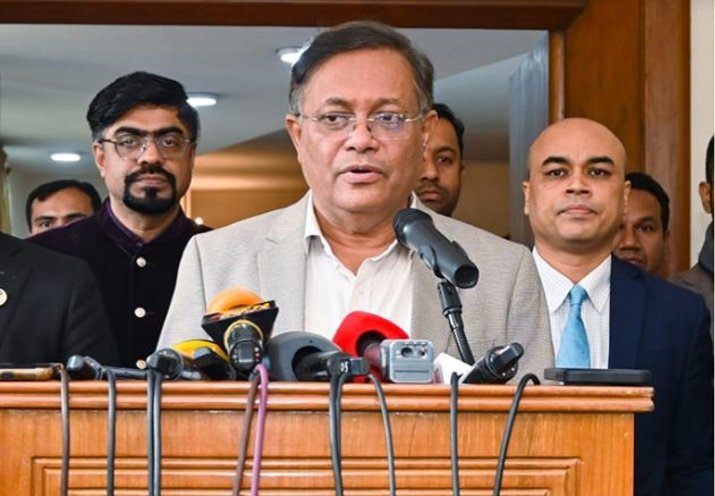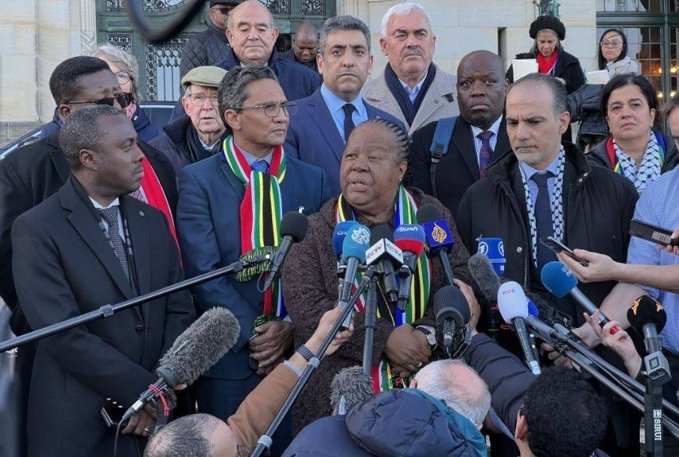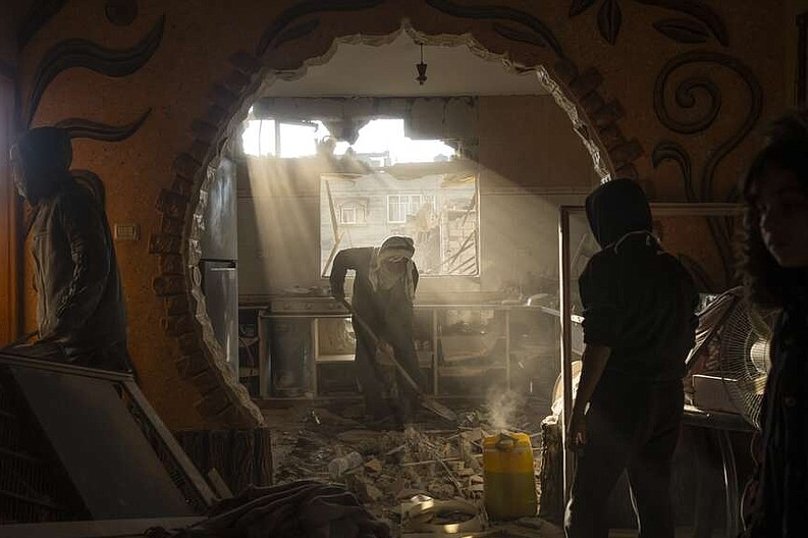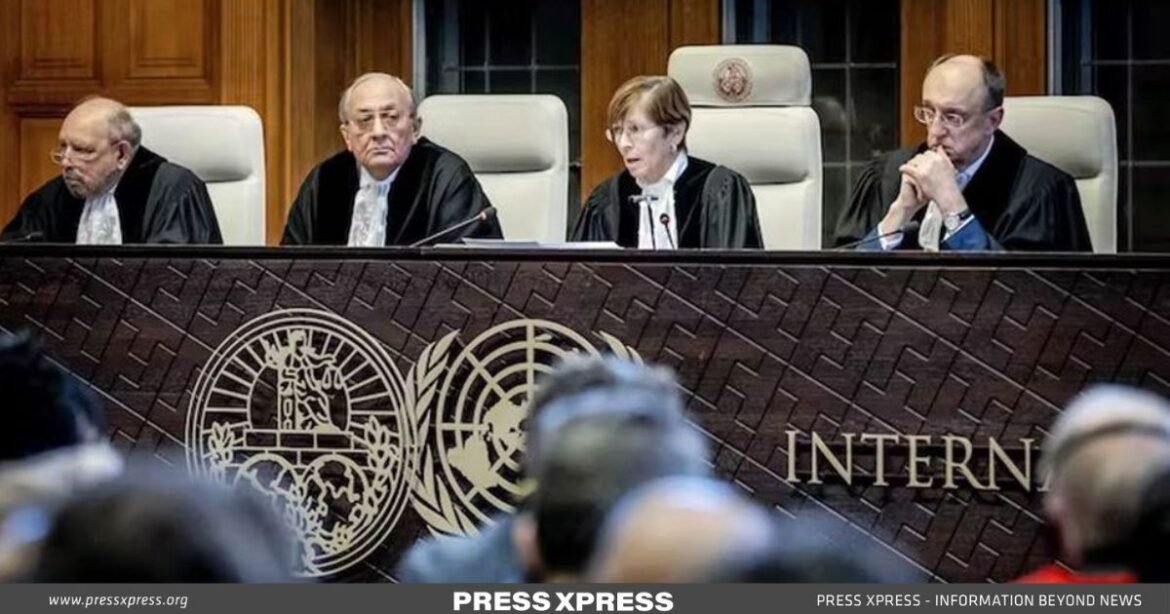Key highlights:
- Dhaka hopes ICJ verdict will help stop genocide
- Arab League to take further step at UN
- Palestine says ICJ ruled in favor of humanity
The International Court of Justice (ICJ) has delivered its highly anticipated interim ruling in South Africa’s case against Israel over alleged genocidal acts in Gaza, ordering Israel to take all measures to prevent acts of genocide.
In the keenly awaited verdict on the Gaza war, the ICJ judges stopped short of ordering a ceasefire but demanded that Israel try to contain death and damage in its military offensive.
You can also read: US Senators’ Letter for Convicted Yunus ‘Unacceptable’
The interim ruling was issued in The Hague on January 26 by a 17-judge panel, led by an American and a Russian and including one each from Israel and South Africa.
In its interim ruling, the court ordered:
- Israel must take all measures within its power to prevent the act of genocide (15 votes to two)
- Israel must ensure the military does not commit acts of genocide (15 votes to two)
- Israel must take all measures within its power to prevent or punish incitement of genocide (16 votes to one)
- Israel must ensure humanitarian assistance to Gaza (15 votes to one)
- Israel must prevent the destruction of evidence of genocide (15 votes to two)
- Israel shall report to the court within one month regarding its compliance with the order (15 votes to two)
Dhaka welcomes ICJ ruling
Bangladesh has welcomed the ICJ’s interim ruling ordering Israel to prevent genocidal acts in Gaza.
“We welcome it. We believe this verdict will help to stop genocide and crimes against humanity being orchestrated by Israel in Gaza,” Foreign Minister Dr Hasan Mahmud told reporters at the state guest house Padma in Dhaka on January 27.
The foreign minister said Bangladesh had supported South Africa on its appeal to the ICJ, and if required, Dhaka stands ready to provide further support to South Africa in its genocide case with the ICJ.

He noted that in its ruling, the ICJ found that Israel committed acts in Gaza that violated the Genocide Convention.
South Africa describes ruling ‘significant milestone’
The South African government described the interim ruling as a “significant milestone in the search of justice for the Palestinian people”.
“I would have wanted that the word ‘ceasefire’ be included in the judgment, but I am satisfied with the directives that have been given,” South Africa’s Foreign Affairs Minister Naledi Pandor told reporters in The Hague.
Speaking at a press conference following the court session, she clarified that South Africa submitted a request to the ICJ under the Genocide Convention, an agreement ratified by both Israel and South Africa. The judges called on Israel to take necessary measures to protect civilians and halt the destruction. The implementation of ICJ orders cannot occur without a ceasefire.
Pandor emphasized that a ceasefire is a fundamental condition for implementing the ICJ decision.

“It’s now a test for the government of the people of Israel as to whether they will act in a manner that says all of us must respect international law,” she said.
Palestine welcomes provisional measures
Meanwhile, Palestinian Foreign Minister Riyad Al Maliki welcomed the provisional measures, saying, “The ICJ judges assessed the facts and the law, they ruled in favor of humanity and international law.”
A senior Hamas official called the decision “an important development that contributes to isolating the occupation and exposing its crimes in Gaza”.
“It is a historic day and we are in close collaboration and consultation with South Africa,” said Palestinian ambassador to the UN Riyad Mansour, adding that he had called for an emergency Arab Group meeting on the ruling.
“We are digging into all the details in order to take the appropriate steps in the Security Council,” he added.
ICJ order significant, not sufficient
Meanwhile, Israel continued attacking civilians despite the ICJ order to take steps to prevent genocide in Gaza.
On Saturday, Israeli warplanes dropped one after another bombs in Khan Younis area of Gaza, increasing the number of civilian deaths.
Although the ICJ did not call for an end to Israeli operations in Gaza, nevertheless, the measures prescribed to prevent genocide have moral significance. Many analysts say that Israel must agree to a ceasefire in Gaza in order to comply with ICJ’s orders.
But despite ICJ orders, Israel has continued its destructive operations in Gaza. In the 24 hours after the passing of the ICJ ruling, 174 people, mostly women and children, were killed by Israel in Gaza, according to the health ministry of Gaza.
On January 27, Israel launched its worst attack on Khan Yunis, in southern Gaza. Dropping bombs and firing tank shells, Israeli soldiers destroyed the area near Al-Amal and Nasser hospitals in the city.

In such a situation, Zainab Khalil (57), a resident of Gaza, said, “The ICJ’s order is important, but not enough. We want a ceasefire.”
Arab League holds session on ICJ ruling
The Arab League has begun an extraordinary session called by Palestine in coordination with Egypt and Jordan to reach a “unified Arab stance” in the aftermath of ICJ’s interim ruling on Israel’s war on Gaza.
The Palestinian delegation to the meeting is led by the Ambassador of the State of Palestine to the Arab League, Muhannad Al-Aklok, along with several senior advisors, according to the Palestinian WAFA news agency.
The meeting aims to take comprehensive measures to prevent prohibited acts under the Genocide Convention, ensure the immediate provision of urgent humanitarian needs for the Gaza Strip, and hold Israel accountable for incitement to genocide in Gaza.
An analysis of the ICJ ruling
Filing of the genocide case by South Africa put Israel in an embarrassing situation before the international community. And due to the ICJ’s interim ruling has now put Israel further cornered legally.
Moreover, Israeli crimes were also proven in court. Israel initially tried to prevent the ICJ from accepting South Africa’s case. But the court has clearly said that South Africa’s complaint was valid and it has jurisdiction to deal with the genocide case against Israel.
Out of the 17-member panel, 16 judges believe that Israel must prevent genocide and destruction in Gaza. At the same time, Israel has been ordered to meet the humanitarian needs of Gazans within one month. The ruling also sends a message to Israel that it will face legal consequences if it does not act according to the court’s ruling.
South Africa requested the court for nine interim measures. Apart from the main demand for an immediate ceasefire, all other petitions were taken into consideration by the court.
An important aspect of the ruling is that the ICJ has called on Israel to take steps to allow aid to enter the besieged Gaza Strip. The order is a significant legal and moral victory for many.
According to experts, the chances of the court ordering a ceasefire were never high due to Israel’s argument that it has the “right to self-defense” in the occupied territories in Palestine.
Juliette McIntyre, a lecturer at law department at the University of South Australia, told news agency Al Jazeera, “I never thought the court was going to order a ceasefire.”
McIntyre said, “The court has argued that it cannot get involved in the question of what is the ultimate limit of Israel’s right to self-defense. So, it did not say anything about the ceasefire.”
Conclusion
Israel has been identified as a criminal in the UN General Assembly many times, but no one is obliged to accept the resolutions passed by the General Assembly.
But there is an obligation to abide by the judgment of the ICJ. In this situation, Israel will have to decide how to implement the ICJ orders. Israel must submit a report to the court on the steps it has taken within the next month.
However, the reality is that although there is an obligation to comply with the ICJ judgment, no mechanism has been put in place to enforce this judgment. Because of this, it is feared that Israel will not implement the court orders under the influence of the United States and some European countries.


